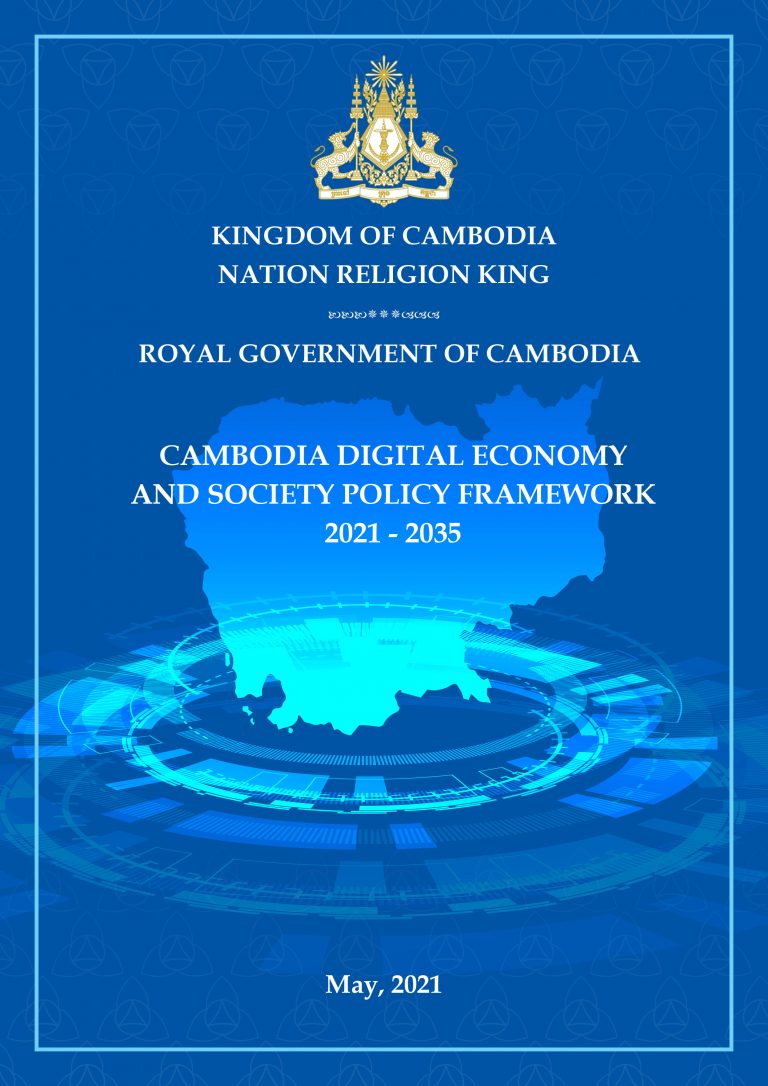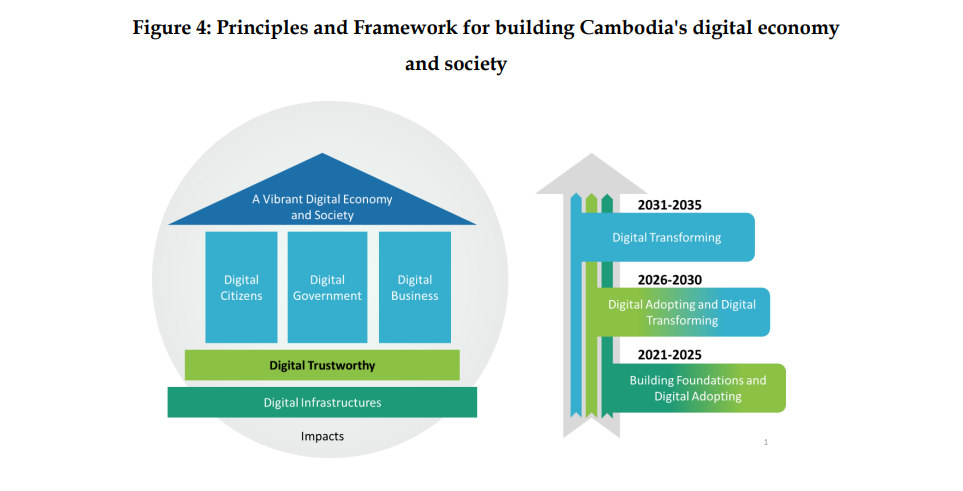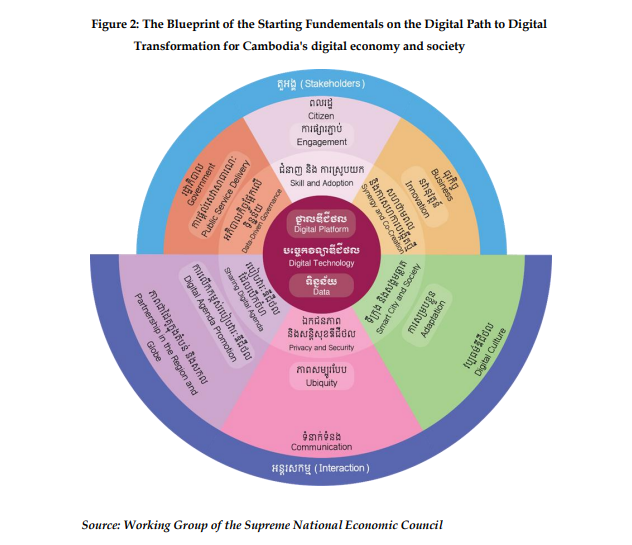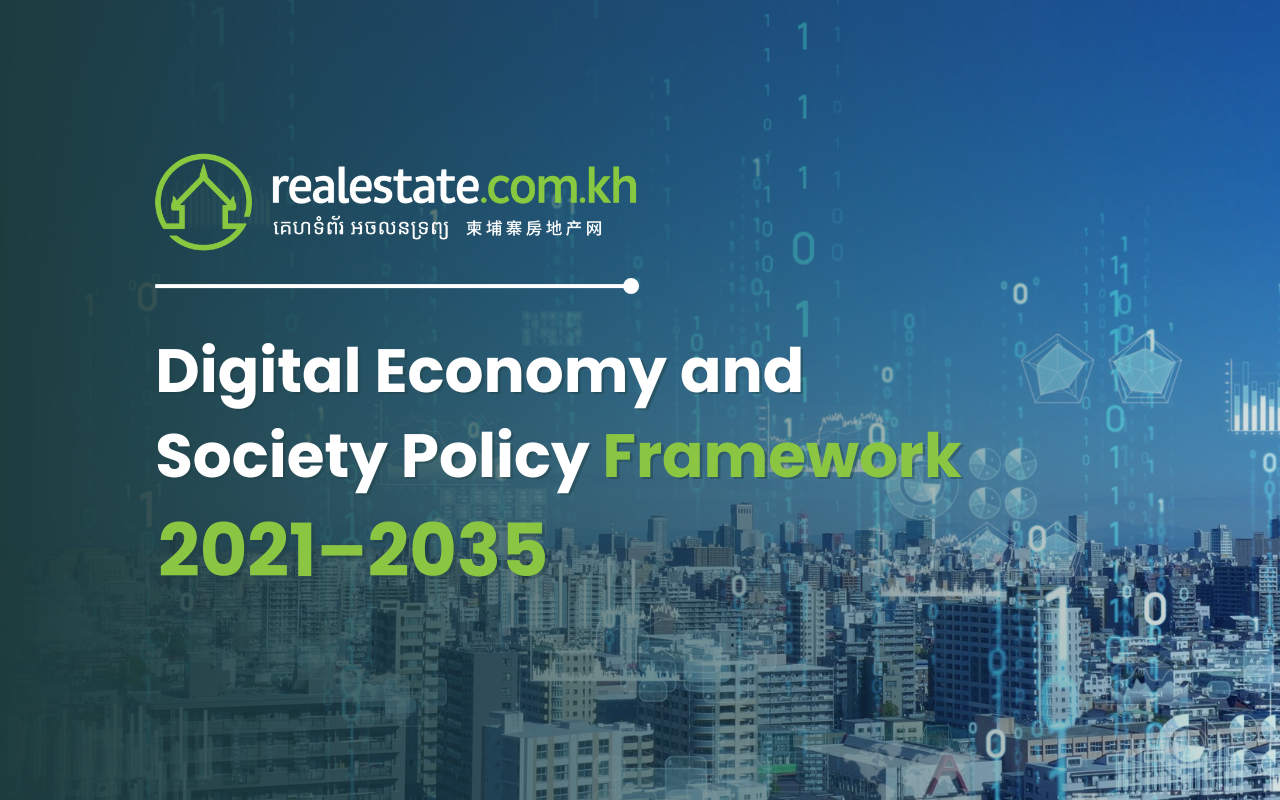In an era where digital transformation drives economic growth and innovation, Cambodia is taking bold steps to modernize its economy through the Digital Economy and Society Policy Framework 2021–2035. This ambitious, forward-thinking policy aims to position Cambodia as a dynamic digital economy within Southeast Asia by embracing technological advancements, digital infrastructure, and innovation over the next 15 years. Here’s a deep dive into what the policy entails and the transformative impact it’s poised to bring.
1. Background and Vision for a Digital Cambodia
The Cambodian government envisions a fully integrated digital economy that supports sustainable, inclusive growth and improves the quality of life for citizens. As stated in the policy framework, the primary goal is to develop a digital ecosystem that not only enhances economic productivity but also aligns with global standards in digital trade, data management, and innovation. By 2035, Cambodia aims to be recognized as a leading digital nation in the region, one that attracts international investments, fosters local innovation, and strengthens its digital readiness across various sectors.
2. Key Objectives of the Policy Framework

The Digital Economy and Society Policy Framework outlines several strategic objectives to drive Cambodia’s digital transformation:
- Economic Diversification: Encouraging the use of digital technology across sectors, including manufacturing, agriculture, finance, and education, to foster diverse economic growth beyond traditional industries.
- Inclusive Digital Access: Ensuring equitable digital access to all Cambodians, especially those in rural areas, to reduce the digital divide and enable widespread participation in the digital economy.
Skill Development: Creating initiatives to upskill the Cambodian workforce, from basic digital literacy to advanced digital skills, to meet the demands of a modern economy. - Digital Governance: Establishing a regulatory environment conducive to digital innovation, cybersecurity, and data protection, building trust and resilience in Cambodia’s digital infrastructure.
These objectives are aimed at creating a balanced digital ecosystem that can serve both economic and social goals, integrating technology into everyday life and business operations.
3. Strategic Phases for Transformation
The policy framework is structured across three key phases, each focusing on specific goals:
- Phase 1 (2021–2025): Building Foundations
The first phase emphasizes establishing the foundational digital infrastructure, such as high-speed internet networks, data centers, and digital ID systems. This phase is crucial for laying the groundwork that will support broader digital adoption and integration. Initiatives under this phase include expanding internet access in underserved areas, promoting e-governance platforms, and launching digital literacy programs in schools. - Phase 2 (2026–2030): Accelerating Integration
This phase aims to integrate digital technologies into priority sectors, such as finance, agriculture, education, and tourism. It will involve developing sector-specific digital platforms to enhance efficiency, productivity, and market access. For example, the promotion of e-commerce platforms for local businesses and agritech solutions for farmers will facilitate growth across industries and broaden the scope of digital adoption in both urban and rural areas. - Phase 3 (2031–2035): Achieving Maturity and Global Competitiveness
The final phase seeks to position Cambodia as a competitive digital economy on the global stage, with a focus on innovation, digital exports, and knowledge-based services. By this phase, Cambodia aims to be a leader in digital governance and to foster a thriving digital sector that can compete internationally, attracting tech-driven investments and nurturing a robust digital startup ecosystem.

4. Fostering a Digital Workforce and Innovation
A central focus of the Digital Economy and Society Policy Framework is workforce development. Recognizing that a successful digital transformation depends on a skilled workforce, the policy prioritizes education and specialized training programs to cultivate foundational and advanced tech skills. In response to the Ministry of Education’s emphasis on digital readiness, the National University of Management established the Faculty of Digital Economy, designed to equip students with knowledge in emerging fields such as AI, IoT, blockchain, and data science. This new faculty aims to provide structured pathways into digital professions, fostering a tech-savvy workforce that aligns with Cambodia’s digital ambitions.

To complement these educational reforms, the policy promotes innovation hubs and incubators that will support startups, allowing Cambodia’s youth and entrepreneurs to create, test, and scale technology-based solutions. By fostering a digitally capable workforce, Cambodia is positioning itself to take full advantage of the opportunities in the digital economy, building a strong talent pipeline that will fuel the nation’s growth in the digital era.
5. Digital Infrastructure Development
Building a robust digital infrastructure is foundational to Cambodia’s digital transformation goals, as outlined in the Digital Economy and Society Policy Framework. By investing in high-speed internet, secure data centers, and advanced cybersecurity measures, Cambodia is establishing a digital backbone that will support innovation and efficiency across all sectors, including real estate.

For the real estate sector, enhanced digital infrastructure enables platforms like Realestate.com.kh to deliver faster, more reliable services to clients and agents. A stable internet network allows for seamless online property listings, virtual tours, and real-time communication, which are essential for connecting buyers, sellers, and developers. As digital infrastructure expands into more regions, it enables greater accessibility to property markets, allowing potential investors to explore listings online from anywhere, thus opening new opportunities for growth.
These advancements are particularly beneficial for real estate companies that rely on digital platforms to reach a broader audience, streamline transactions, and provide transparency. With a stronger digital infrastructure, Cambodia is setting the stage for a modernized real estate market, fostering trust, accessibility, and efficiency for all stakeholders involved.
6. Promoting E-Commerce and Digital Trade
The rise of e-commerce in Cambodia has been remarkable, with an increasing number of businesses and consumers participating in online transactions. The policy framework includes measures to strengthen digital trade by improving payment gateways, logistics, and customer protections. By standardizing and simplifying the digital trade environment, Cambodia aims to attract more international e-commerce platforms and encourage local businesses to expand their online presence, driving growth in the retail and services sectors.

7. Building Digital Trust Through Regulation
As digital adoption accelerates, maintaining a secure and trustworthy digital environment is essential. The framework emphasizes digital governance through data protection laws, consumer protection policies, and cybersecurity protocols. These regulations aim to safeguard users’ data, ensure fair trade practices, and foster trust in digital services. By implementing these protections, Cambodia aims to create an environment where individuals, businesses, and investors feel confident engaging with digital platforms and services.
8. Challenges and Opportunities
While Cambodia’s Digital Economy and Society Policy Framework is an ambitious step forward, it comes with challenges. Limited internet access in rural areas, low levels of digital literacy among the general population, and funding constraints for infrastructure development are key obstacles. Addressing these challenges requires a concerted effort from both public and private sectors, as well as partnerships with international stakeholders.
However, the opportunities are immense. As Cambodia progresses through each phase, the potential for economic growth, job creation, and technological innovation will expand. The digital economy opens doors for new business models, enhanced efficiency, and increased competitiveness in the global market.
A Digital Future for Cambodia-
The Digital Economy and Society Policy Framework 2021–2035 is a transformative vision that places Cambodia on the path to becoming a digitally empowered nation. Through careful planning, phased implementation, and collaboration with key stakeholders, Cambodia aims to unlock the full potential of digital technology. This policy framework not only promises economic growth but also seeks to create a society where digital inclusion is a priority, ensuring that all Cambodians have the opportunity to benefit from a connected world.
As Cambodia moves forward, this ambitious policy stands as a testament to its commitment to embracing the digital future, with the promise of a more vibrant, inclusive, and sustainable economy for generations to come.




Comments